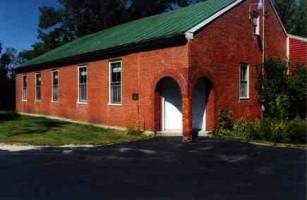Durham Friends Meeting House

The earliest Friends in the area moved to Royalsborough from Harpswell in the early 1770s They were soon followed by Friends from New Hampshire and Falmouth. Meetings were held in the home of Joseph Estes, and in 1775 the small group was organized as Durham Preparative Meeting, a part of Falmouth Monthly Meeting.
In 1790, the Durham group was large enough to be set off as a separate Monthly Meeting, and t feel the need of a regular meeting house.
A deed for the land was given by “one Joseph Estes, yeoman” who for the consideration of two pounds conveyed the lot of land consisting of three acres or there abouts to “Josiah Rogers, tanner and George Phil brood, yeoman” who represented the Dunham Monthly meetings of Friends.
In 1794, Falmouth Quarterly Meeting formed with the first meeting held at Durham “the 4th of 12th month”. The Durham Meeting must have been very active, as it mothered Friends groups in the communities of Lewiston, Greene, Wales Leeds, Pownal, and Litchfield.
By 1799, the first meeting house had been outgrown, and in 1800 it was replaced by a two. story building. In the summer of 1829, a very dry one, this meeting house burned. The cause wet thought to be a spark from a nearby blacksmith shop. A new meeting house, the present one, was completed in the 12th month of that year.
The cost of the 40 by 60 one-story brick building was $750 It had two doors, two chimneys, and big wooden shutters inside, which could be lowered to divide the room for men and women meetings.
In the remodeling of 1900 (at a cost of $1,085) the doors were bricked up and the present corner entrance put in. Also the walls separating the hall and vestry were put in. Another change in the building came in 1957, when the vestry was extended, the stage, nursery, bathrooms and kitchen added, and the furnace installed. More remodeling was done after a fire in 1986. A wheelchair ramp was added and other improvements made.
Durham Meeting is of course not a building. The members from the beginning have tried to serve in the community as members of the Body of Christ. All members are considered to be ministers though since early days those with greater gifts have received special recognition. Those recorded as ministers from Durham Meeting include Macajah Dudly, Lemuel Jones, Nathan Douglas, Mary Tuttle, Stephen Cartland, Marquis Thomas, Alvano Goddard, and Lina Lunt.
In 1914, Durham Meeting adopted the “pastoral system” of hiring one special minister to lead the Meetings for worship. Laura A. Ellison was the first pastor, followed by Susan B. Sisson. Later pastors have included Harold Tollefson, William Prideaux, Milton Hadley, Herbert Kimball, Dwight Wilson, Peter Crysdale, and others. The present pastor is Ralph Greene.
In the early days of the Meeting, Elders and Overseers, two or three of each, were appointed to encourage and assist the ministers, and to oversee the moral lives of the members. Many of these Friends were very helpful with loving advice, counsel, and encouragement, and with great tact and kindliness helped many to straighten out various difficulties. If, however, all efforts failed, and the difficulties could not be adjusted to the satisfaction of all, the erring members were released from membership.
All Meetings for Business are presided over by a Clerk, who keeps records of the proceedings and determines what decisions have been made. Since there is no voting in a Friends Meeting, this calls for careful listening to what is said, and for great sensitivity to the attitudes as well as the words of all present. Some Clerks have served for long periods: Lemuel Jones, Charles W. Webber, Anna J. Goddard, and Ada F. Weed all served for 20 years or more. The present Clerk is Robert Marstaller.
Durham Meeting has been an active part of Falmouth Quarterly Meeting since 1794. Once each year the sessions are held at Durham; originally in 12th month, then in 8th month, then 1st month. For many years the August “Quaker Quarterly” was a major event in Durham, with so many people attending that two simultaneous services were held, one in the meeting house and one in the grove behind it.
Durham Meeting has been active in many areas. In 1833, recognizing the value of knowing its own background, the Meeting established its own library. This has grown over the years to a substantial collection, and is still in use.
Friends have historically been strong advocates of the Temperance Cause, and in 1874 the Meeting appointed its first Temperance Committee. Many members of the Meeting were active in the WCTU during that group’s busy years.
In the early days Durham was more concerned with local missionary efforts than with foreign ones, but by the 1890’s there was a great interest in Missions. One of Durham’s members, Lina-B. Lunt, spent 25 years as a missionary among the Indians of Kansas.
Friends have a long tradition of working for peace. In Durham Meeting this has mainly been done through donations of money and clothing to the American Friends Service Committee, to help victims of wars or of other disasters. The Meeting has felt a special concern for more equitable distribution of food throughout the world, and has expressed this concern by raising special funds for famine relief, and by studying ways of raising, preserving, and distributing more food locally.
The Meeting at present is smaller than it was, but it is active. Sunday School for all ages is held each week at 9:30 am, followed by Meeting for worship at 10:30 am. Daily Vacation Bible School is held for two weeks each summer. We welcome all to worship with us, as we strive to serve God in our community.

